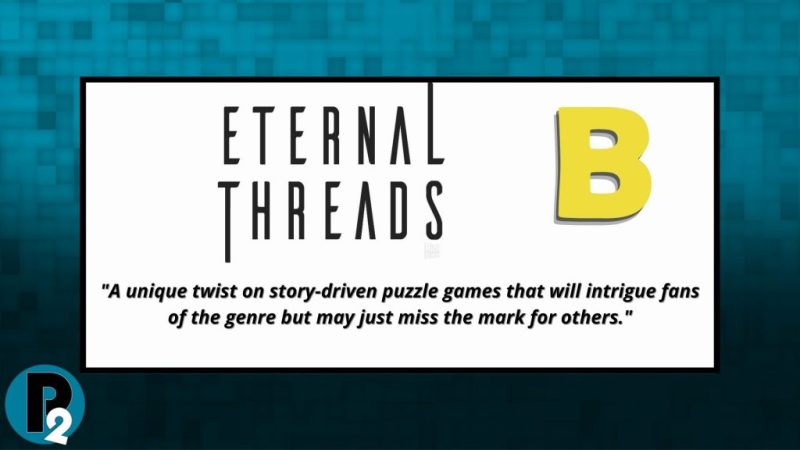Eternal Theads – A Time Travel Tale
PC
Despite every time travel narrative warning that it’s a terrible idea to meddle in past events, Eternal Threads – a game about “altering the past to save the future” asks the player to do exactly that. The Doctor would weep at the main gameplay mechanic, which has the player revisiting multiple moments in the timeline of six housemates killed in a house fire in 2015 in an attempt to save them from a horrible fate by manipulating their past choices to ensure that they aren’t in the house when it burns. It’s a collection of cool ideas woven into an intriguing style of gameplay, but it takes some patience to get it right – and patience is what you’ll definitely require to see this game through.

For reasons that are not quite clear, it isn’t possible for you – an agent from a mysterious agency – to simply stop the fire. Apparently, that will have too many ripple effects and create other problems in the timeline where meddling in the trajectories of six separate lives seemingly won’t. So instead, you arrive at the ruins of the burned building with a collection of technology that allows you to recreate moments from the week leading up to the fire, which will in turn change your surroundings. When you arrive it the house it feels a little spooky, and I absolutely went back to check that I wasn’t secretly playing a horror game, because it feels like something is going to come crawling out of those abandoned walls and attack, but thankfully it didn’t. Walking around an abandoned building creates a sense of tension, but in the style of something like Gone Home, tension is all it is. Nothing will attack you, nothing is waiting to jump out, and rooms will only change when you’ve made decisions that might lead to different objects finding a home within them for story reasons, not poltergeist reasons.

The housemates themselves – Tom, the landlord; Neil, a classic lad with a tendency to get into a fight, and his sister Linda who is staying at the house while she works through some marital problems; artist and student Raquel who is trapped in the (metaphorical) past, and her best friend Jenny, who lives with her doctor boyfriend Ben – are all well-formed characters, and their demons are believable as ones that we might all have to face. I like the narrative choice to make them all fairly regular people, with the idea that even what we see as mundane actions and choices can have huge consequences coming through clearly, but it does make it a little tricky to see why these particular people then need to be saved from this house fire. There’s a bit of a twist that gives some hints as to the reason, but even that isn’t explored particularly closely. It’s clear that it would be in a sequel or some extra content – the game sets itself up well for that – but that feels like a pretty big gamble to take.

The gameplay itself will either grab you, or it won’t. The story is compelling and I did find myself wanting to save the characters, but changing the events in the timeline itself can often feel a little tedious. You can move through the timeline and interact with events in any order, which means that you can follow your own threads through to their conclusion, or you can watch the whole story play out in order backwards or forwards, but you will find yourself revisiting events fairly frequently. It isn’t always clear how changing things will affect a future, which is a blessing and a curse. In the beginning, it’s fun to explore how making different choices (each choice is just a binary decision on how a character reacts in a situation) can lead to new story threads, but when you start to get close to the end, it can mean a fair bit of time just spent wildly trying to switch things up and hoping you hit on the right set of choice to get you where you need to go. If you do want a tighter experience there is an included option to experience an abridged version of events without all the padding, which definitely helps – the full game can feel a little drawn out.

While your choices can ultimately lead to different futures for the characters, in many ways it does feel like you’re each choosing for them to be miserable, or to live a fulfilled life. There’s clearly one ‘right’ answer for everyone, and while that makes ‘completing’ the game feel a little more linear and concrete, it does take the choice out of it. I found myself wanting a future for one character that I thought would make her happier, but pursuing that seemed to bring about a whole heap of other elements to her future life that made it all seem very negative. A little more variation there might have been nice, but I can also understand the idea of an ‘ideal’ future to work towards. If that hadn’t been there, I probably would have been talking about how it was hard to know whether I’d made the ‘right’ choices, so your mileage may vary etc on how it all ultimately plays out.
All in all, I have great respect for what the team have tried to do here with Eternal Threads. The narrative is fairly compelling, and the way this game plays with time mechanically is still quite unique for games. It didn’t quite hit all the marks I was hoping for, but Cosmonaut Studios have created an interesting narrative experience here that fans of walking simulators and narrative exploration games will find a lot here to enjoy. Plus, there are times when it just feels like an episode of Neighbours or Eastenders playing out in real time, so if you just like watching human drama play out, there’s something here for you too. Even if you will spend time feeling like you’re going against some of the core principles of time travel.

Player 2 reviewed Eternal Threads on PC with a code kindly provided by Secret Mode.














